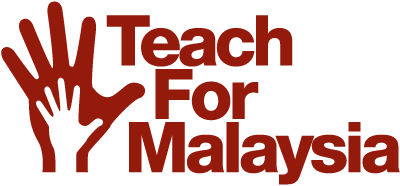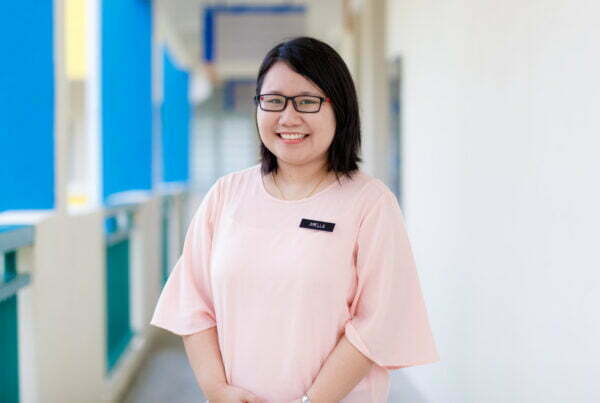Every year, TFM runs Kem SKORlah – a holiday programme where future TFM teachers (our Fellows) run English and Sejarah lessons for 3 weeks. It’s run entirely by TFM, making it an ideal place for us to bring to life our vision for education.
Guiding Principles of Kem SKORlah
The vision for Kem SKORlah is for school to be an inclusive community where all children can attain a great education and are empowered to lead their own learning.
TFM believes that empowered students will demonstrate strength in the 3 areas of: student voice, capability, and values.
- Student Voice: Students feel that their opinions matter. TFM places emphasis on enabling students to actively contribute in class as well as have the opportunity to guide and lead groups. This year, a group of dedicated group of student volunteers were also part of running operations for Kem SKORlah.
- Capability: Students are able to articulate their growth and achievements. It is important that students are equipped with knowledge, thinking skills, and the ability to reflect, to be able to do this.
- Values: Students are willing to take action to solve issues in their community. For this to happen, students should have opportunities to learn and practice ethics, demonstrate leadership and interpersonal skills.
This writeup will take you through the aspects of Kem SKORlah, and what our students experience on a daily basis in this programme.
Student Voice: Creating an Inclusive Environment Together
Before Kem SKORlah starts, Fellows are divided into groups of three. Each group is given complete responsibility over their own class. Fellows work together in their groups to come up with a vision for their classroom, set norms to influence classroom culture and plan their lessons.
The first thing they decide together? What to name their class!

Gone are the days where chalk and talk made up the entire learning process. This group of Fellows hope their students will speak up and actively engage in meaningful discussion.
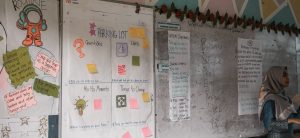
One of the most important aspects of creating an inclusive community is the classroom culture; the norms or guidelines in the classroom.
These guidelines can be centred around values such as respect, kindness, and curiosity or around specific practices like asking permission to leave the class and lining up in the morning. They are decided by either the Fellows, their students or jointly. It’s important that both parties agree on the final set. Capturing the class’s guidelines on a noticeboard allows it to always be referred to when in doubt.
Fellows have full autonomy over the decoration of their classroom. This group of Fellows have set up a ‘Parking Lot’ to let students ask questions, give feedback (“likes” and “things to change”) and share their thoughts (“ah ha moments”) freely. This way, students who may be shy or find they have a question after class can still express themselves.
At the end of each week, students of all classes give feedback to Fellows by answering a set of standard questions such as “The teacher and students work together to create a learning environment that welcomes views and opinions” and “The teacher explains concepts clearly”.
Growing Capability with Student-Centred Learning
Walking around Kem SKORlah, movement and excitement is palpable in classrooms. These are not classes out of control but classes deeply involved in some sort of activity. Fellows often try to incorporate activities such as presentations, debates, group discussions, even games into lessons to ensure students remain engaged through a fun, interactive learning experience.

Group presentation: Students have the chance to become the teachers, presenting the subject to their peers.

“Gallery walk”: A time where different groups walk around the classroom to view and have the work of other groups presented to them.
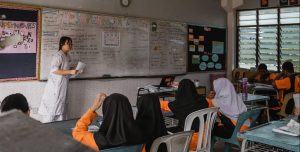
Must haves on the whiteboard:
- Lesson objective (What are we learning?)
- Success criteria (What do we want to achieve?)
These goalposts ensure both the Fellows and students are on the same page before the lesson even begins. It makes it easier for students to be aware of what they are learning and assess if they have met the success criteria at the end of the lesson. This one of several steps to ensure students are aware of their progress in learning.
It is also easier for the teacher to ask the class to indicate with a thumbs up or a thumbs down if they have achieved the success criteria at the end of the class. This way, Fellows will know if they need to place extra emphasis on the topic another day.

A student presents her class’ current progress in Reading, Writing, and Speaking. Progress reports are possible when students can see their own progress and know what they have yet to learn.
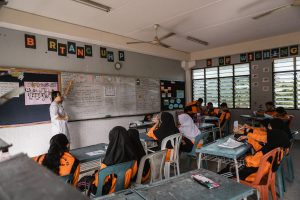
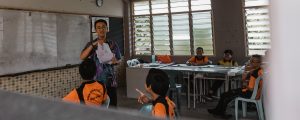
Fellows experiment with different seating arrangements depending on what they want to achieve in their lessons:
- Sitting in threes allows for work in small groups while still being orientated towards the whiteboard.
- Students sit in larger groups and do not necessarily need to face the whiteboard.

When it is time for quiet work, Fellows employ attention grabbers like this to grab their students’ attention quickly. Here the teacher holds up her hand and students who notice this follow suit. In a matter of seconds, the class will be silent, still, and looking towards the teacher. Fellows no longer need to raise their voice to catch the attention of the whole class.
Student Leaders with Strong Values
In the last class of the day, students work in groups to identify a problem within their community and propose a solution for it. This may seem far removed from learning English, but working on this project allows students to practise speaking in English with each other and helps develop leaders who not only take charge of their own learning, but are able to speak up as student leaders in their communities.
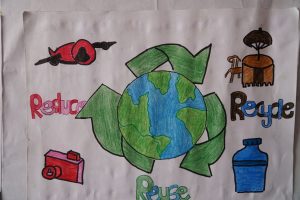

Students will present their final project to peers, parents, and visitors on the last day of Kem SKORlah.
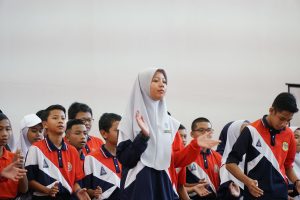
A day at Kem SKORlah ends with an assembly, where all important announcements are made. Before students go for lunch, a class is chosen to lead the school in a cheer. The cheers are a way of growing their school spirit and reminding students of the core values of Kem SKORlah.
A Learning Process For All
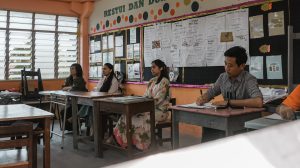
School may be over for our students, but it is only the beginning for our Fellows! During lessons, Fellows are observed by their pedagogical coaches and external visitors such as Alumni, partners and donors. The classroom observers debrief with Fellows, passing on any feedback or suggestions they may have.
We want to ensure the student voice is always represented in all that we do. This year, we had student volunteers who joined the pedagogical coaches to observe and give feedback to our Fellows in training. Thus, lessons can be carried out in a way that truly works for students.
All these efforts ensure a continuous loop of learning and improvement throughout Kem SKORlah, so that Fellows are fully prepared to teach in schools in 2020.
While Kem SKORlah may be over for this year, it’s gotten us all the more excited for 2020; the new year and new decade! To the Fellows of our 2020 Cohort, we thank you for your commitment to #breakthecycle through education and wish you all the best in starting your Fellowship next year!
